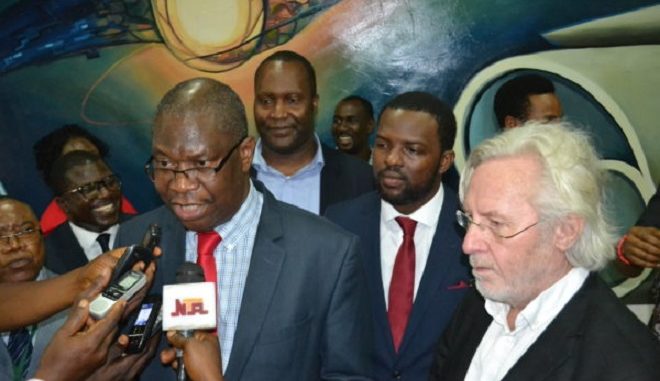
The University of Nigeria, Nsukka (UNN) will soon be producing laptops and tractors at it new science and technology incubator called “Roar Nigeria Hub”.
The hub, which is embedded in the university, is the first of its kind in West Africa.
The launching was a dream come true for Professor Benjamin Ozumba, the Vice-Chancellor, who after visiting a science park in Sweden in 2016, vowed to establish same in the University of Nigeria.
“We want to turn Nigeria around with inventions and innovations” Ozumba said that “very soon; you will hear about students of UNN making laudable inventions in ICT and other fields of life”.
Ozumba took the first step of ensuring that students of the university are IT compliant in 2015 when he mandated that every student of the university must own a laptop computer in order to meet the demands of the 21st century tertiary education.
Although the policy attracted mixed reactions leading to the removal of the compulsory clause, Ozumba however believes that the university has the capacity to assemble its own laptop.
“In the next few months, made in UNN laptops will flood Nigerian market, this is the first mandate of Roar Nigeria Hub”, he said.
Laptops will not be the only products of the hub; the Vice-Chancellor said the university would soon start assembling tractors for agricultural use.
He challenged the Roar Nigeria Hub to come up with innovations that would curtail wastage of agricultural produce in the country.
Borne out of collaboration between the university and the Benefiting Our Community (BOG) Innovations, Roar Nigeria aims to produce new generation of innovators that will provide local technology-based solutions with global perspective.
The hub is built on the concept of triple helix, which is an interaction between the academia, the industry and the government to promote ideas, and marketable innovations among students and researchers.
The launching of Roar Nigeria Hub attracted foremost IT companies, including Google, Facebook, Huawei Technologies, Nigeria Communication Commission (NCC), National Information Technology Agency (NITDA), Computer Warehouse Group, and Exxon Mobil.
The mood of the event was set by an emotional opening prayers said by Professor Patience Osadebe, the Dean, School of Postgraduate Studies of the university.
The Professor pleaded with God to cast away the spirit of consumerism from Nigerians and grant the citizens the wisdom to be productive. “We are tired of benefiting from food is ready” Osadebe prayed God to “help us cook our own food for others to eat”.
Osadebe’s prayer was echoed by the Governor of Enugu State, Hon. Ifeanyi Ugwuaanyi, who in his address noted that Nigeria would not attend the desired level of development if it continues to rely on technologies produced by other nations.
The governor, who was represented by the Enugu State Commissioner for Science and Technology, Engineer Greg Nnaji, said the concept of the hub was in line with the effort of the government to entrench information technology culture in the society to boost economic development and produce employment for the youths.
“By establishing this facility” the governor said that the “University of Nigeria, Nsukka has once again demonstrated its willingness and capacity to take up the challenge to deliver scientific and technological breakthroughs, which, with the support of the private sector, would impact on the economic fortunes of the nation”
Part of the promises of the hub, is to assist young innovators secure funds to set their ideas in motion; provide mentorship to young innovators, and support innovative ideas into marketable products.
“Roar Nigeria Hub is an ecosystem that supports upcoming entrepreneurs by providing professional support to enable the young minds convert their ideas to marketable products” said the Chairman/Director of Roar Nigeria, Okechi Igwebuike. He noted that the hub would enable the creation of indigenous solutions, jobs and economic growth within its environment.
Igwebuike said the initiative was private sector driven would be taken to other universities across the country.
The hub started on a good note with three innovative groups presenting their proposals.
The first group called “AGROMESS” developed an app that will help farmers solve the problem of wastage of agricultural products. The app will help identify parts of the country that have surplus agro products and link them to areas where the products are scarce.
The second group called “Malicha” developed a mobile app that uses artificial intelligence to recommend hairstyle that will fit a particular facial make-up.
The third group called “Thrillers” developed an app that will notify people of events happening around them in their mobile phones. All the proposals were made by students of the University of Nigeria
Source – NAN
